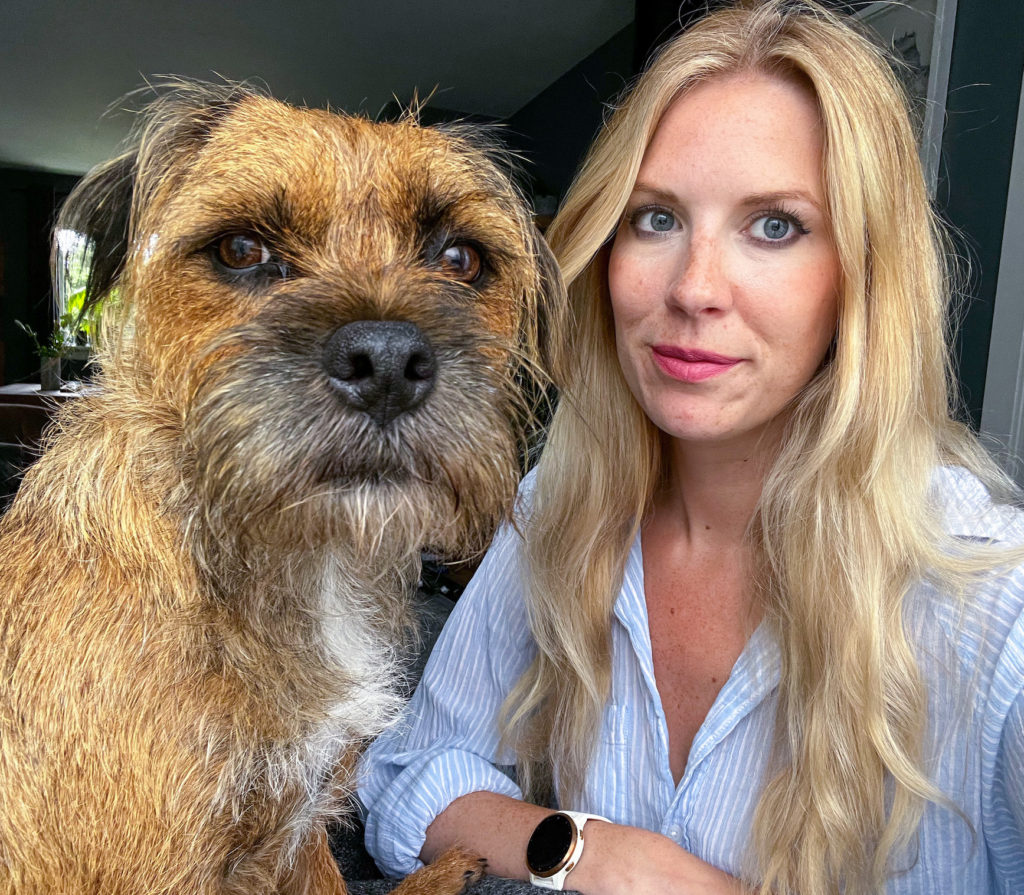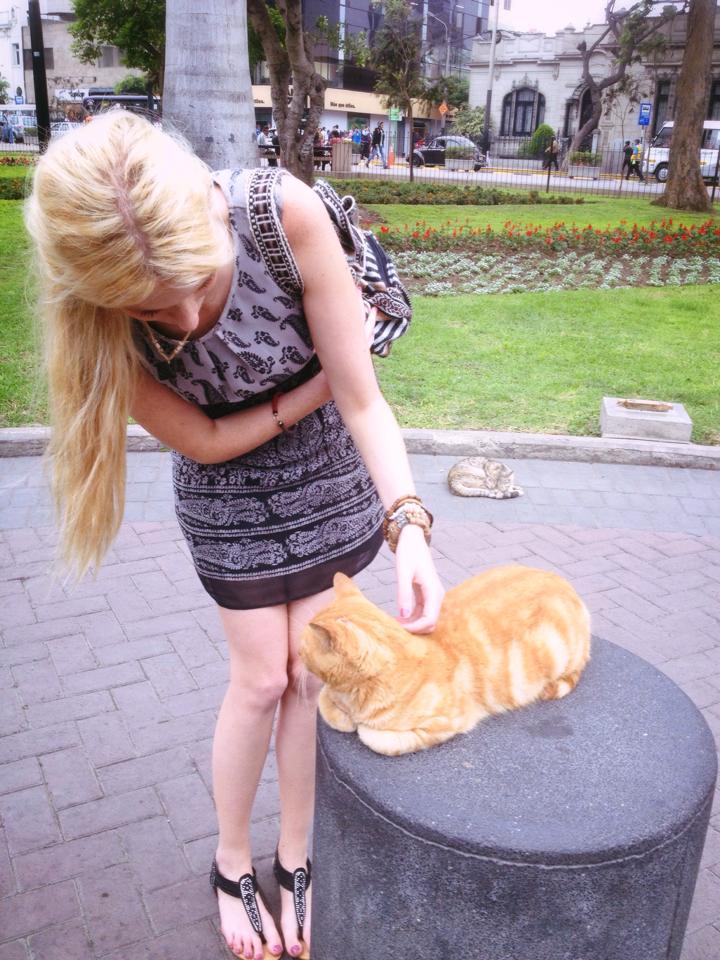Did you know that anthrozoology is the study of how humans and animals interact and relate to one another? The science blends fields such as the humanities, social science, behavioral science, and biomedical science to understand human-animal connections.
Meet Dr. Roxanne Hawkins, Researcher and Lecturer in Psychology at the University of Edinburgh, Scotland. Dr. Hawkins’ work lies within Developmental and Clinical Psychology.
Dr. Hawkin’s research focuses on the benefits of human-animal relationships for people’s well-being, child development, and pet welfare. She also carries out work to understand and prevent harm to animals. For example, she looks at the role of animals in adversity, such as child and domestic abuse. She works with UK animal charities such as the Scottish SPCA, RSPCA, Dogs Trust, and Cats Protection. Dr. Hawkin’s most current research looks at how animals affect mental health, including how animals can help people cope and recover from mental health problems. As such, Dr. Hawkins’ research has raised awareness of the important role of pets in people’s lives.

In one recent study, she and her colleagues surveyed 119 adults who had a mental health disorder(s) and/or who struggled with a mental health problem(s). Animals helped in many ways. For example, animals helped reduce people’s anxiety, panic attacks, loneliness, and risky behaviors. Animals also helped most people cope with their problems, feel more motivated, and be more social and active. Importantly, animals made people happy and ‘feel good’.
Severe mental health problems can lead some people to harm themselves and to have harmful thoughts, such as suicide. Dr. Hawkins’ work showed that pets helped to reduce some of these urges and harmful thoughts. People mentioned that the touch of a pet, or the funny things they did, helped them to cope with life more easily, helped them to “get up every day,” and gave them a “reason to live.”
The support from pets cannot replace the expertise of a mental health clinician. However, Dr. Hawkin’s study provides scientific evidence of the many ways pets are therapeutic. They can decrease anxiety and self-harm, and help people live well despite having mental health difficulties.
Welcome, Dr. Hawkins. We’re delighted to have you here!
Dr. Hawkins: Thank you -it’s great to be involved!
Mewla: Tell us, what inspired your work in anthrozoology?
Dr. Hawkins: I guess I have always loved animals and have been interested in our relationships with them. Since I was young, I feel like I have had a strong connection to animals and feel empathetic to their needs. When I was a child, I looked after more stuffed animals than I did baby dolls, and I spent most of my time talking to and playing with my pets.

I have always had really strong bonds with my pets and have personally felt the benefits of them. I’ve also always been curious as to why some people feel so strongly bonded to animals, while others aren’t bothered or even harm animals. I’ve always been passionate about animal welfare too and working with animal charities was my dream. So when I discovered I could potentially have a career in learning about our relationships with other animals, to benefit both people and animals, it filled me with excitement and I’m so happy I get to pursue my passion!
Mewla: As a fellow animal lover and scientist, I can’t tell you how excited that makes me as well. You are studying such important issues, that I don’t know where to start. Can you tell us about any current projects you have underway?
Dr. Hawkins: Sure. I have a few different projects related to human-animal relationships that are ongoing. The first one is funded by SCAS (Society for Companion Animal Studies). I am investigating the benefits and risks of pets for young people’s anxiety and depression. There are two parts The first is an online survey that examines whether people’s 1. types of attachment (secure vs insecure) to their cats and dogs, 2, existing pet welfare and behavioral problems, and 3. relationship satisfaction influence people’s mental health symptom severity. I will analyze this data using statistics.
The second study is an interview study where we examine the human-pet relationship in-depth to explore the lived experiences of pets for mental well-being.
Another project is examining the role of pets in maternal mental health (pregnancy to the first year of a child’s life) to see whether people’s relationships with their pets change during this time and whether pets are supportive during this time too. We will also examine the relationship between pets and the new baby in this study. We have just finished data collection so I’m looking forward to seeing the responses.
I’ve also carried out work on the role of pets in experiences of domestic abuse and am currently setting up a collaboration to carry out research on the Cats Protection Fostering Programme ‘Paws Protect.’ We are at the very early stages but I’m excited to get started.
Mewla: These are such amazing research topics! I’ve read about how domestic abusers who harm their spouses and/or children typically also harm pets or use them to threaten a spouse to stay. Thank you for doing such important work that will bring awareness to these unseen victims of abuse. We will look forward to keeping up with and learning about your new findings!
Your university—the University of Edinburgh—just hosted the International Human-Animal Conference (ISAZ). Please tell us more about the research presentations you chaired at the conference.
Dr. Hawkins: Yes, we were very excited to be hosting the conference at the University of Edinburgh as I’ve been attending the ISAZ conference since I was a student. We had over 260 delegates from different fields. They included researchers, practitioners, and animal welfare charities. There was a broad range of talks—from pets and mental health, animal-assisted therapies—to animal behavior and welfare projects.
I chaired sessions relating to human-cat relationships, children and animals, animal therapies, and behavioral challenges in pets. I also had the pleasure of introducing our keynote speaker Professor Hannah Buchanan Smith from the University of Stirling. She talked about her 30+ years of research with non-human primates. I gave a talk on our study on young people’s pets and mental health, and one of my researchers presented a poster from our child-dog bond project. I also had a PhD student presenting her work on people’s attachment to pets, perceived pet sensitivity and responsiveness, and people’s well-being.

Mewla: Your research has continued to support the important role of animals in helping human’s mental health. I’m curious, how have researchers in non-animal-related research fields responded to your work?
Dr. Hawkins: When I first started out, work in human-animal relationships was perhaps not taken very seriously, especially here in the UK. I guess it was seen as a ‘fluffy subject’, and I did worry that I would struggle to find a job if I was ‘too animal’ focused. It was also seen as perhaps not scientific enough. Things are definitely changing though, and over the last few years, human-animal research has really taken off across the world! People are seeing the value in the research, and there is more investment into funding the research too.
You see so many more animal charities incorporating research into their strategies Many non-animal practitioners now include animals in their therapeutic work as well. For example, dogs, horses, and even alpacas are commonly involved in mental health work.
At the ISAZ conference, there was even a workshop on cat-assisted counseling! Here at the University of Edinburgh, we have just launched a canine-assisted mental health program for students struggling with their mental health, this work is led by Prof. Jo Williams. Many other universities have also had therapy animals on campus to help homesick students, so human-animal work is becoming quite popular and more ‘mainstream’.
Mewla: What a wonderful idea. Wouldn’t it be great to have a pet in every dorm! (except for the dorm for students with animal allergies, that is.) I’m sure you’ve heard some very touching stories as you’ve conducted your work. Can you tell us a story that you came across while doing your research?
Dr. Hawkins: There were some sweet accounts from my current research study about how cats improved young people’s mental well-being. One young woman talked about her anxiety problems, and how she had a fear of the dark. She felt like her cats sensed her anxiety and stayed close to her, sleeping on her bed so that she could fall asleep and feel safe at night. The cats also helped her to feel less alone at nighttime.
Most people talked about how their cats were really calming and provided them with a sense of comfort, love, and friendship that was nonjudgmental and unconditional. They talked about how their cats seemed to understand when they were upset. Their cats stayed close to them and sought affection which was really helpful, especially on a bad mental health day. These accounts show how responsive and attuned our pets can be to our emotions and the attachment they have to us.
Mewla: Cats are truly “therapists with whiskers,” lol. I know many more people who are suffering from mental health problems could benefit from pets. Your research helps mental health providers get out the word. Also, these studies help them to understand what types of people will benefit from pets, and which may not have the capacity to care for a furry friend.
And, when did you first have the pleasure of animals in your life?
Dr. Hawkins: I always have! My earliest childhood memory was of my parents surprising me with my first pet dog Shona and it was such a happy memory. There were always other animals around the home too and in my life. We had fish, rabbits, hamsters, and gerbils growing up, and I even had a pet mouse at one point as a teenager. I also grew up with my nan’s two cats, Zoe and Patches. They were two gorgeous ginger cats with completely different personalities. Patches was my favorite because he was so chilled and enjoyed affection from me.
I also grew up with my auntie’s cat Tammy. Growing up I was always the child searching for the pets in whoever’s house we were visiting, and I’d always prefer to hang out with the animals than I did the humans!
Mewla: I can’t tell you how much I (and I’m sure our reader friends) relate to being drawn to animals. In fact, I’m sure to seek out any pets in the house when I visit a friend. Luckily, my friends tend to be animal lovers and understand, lol.
One last question. Who are the animals in your home today?
Dr. Hawkins: I just have one animal at the moment, a gorgeous border terrier called Darwin. He is four and a half years old and the best thing that has ever happened to me. He is the most affectionate and playful dog and loves everyone he meets. I would like to get more animals, perhaps another dog so he has a sibling to play with. I would love cats but sadly Darwin is terrified of them, so for now I have to settle for saying hello to the neighbor’s cats who chill out in my garden!
Mewla: LOL. Darwin is gorgeous! Dr. Hawkins, I can’t tell you what a pleasure it was to meet you and hear about the amazing work you are doing.
Thank you so much for joining us today. We will be sure to keep up with your research.
🐾🐾 To learn more about Dr. Hawkins’ research, go to: https://www.ed.ac.uk/profile/roxanne-hawkins
🐾🐾 Dr. Hawkins has set up a Facebook group ‘Science of Pets’ to share research studies relating to human-animal relationships. She also posts opportunities to take part in research on this page. Check it out at: https://www.facebook.com/scienceofpets/
Please leave your comments or questions
about the Dr. Roxanne Hawkins article below.
Have a suggestion? Send us a message via our Contact Us page.




Great post – such an interesting area of research.
Great article and congratulations to Dr. Hawkins. I love the idea of cat-assisted counseling! Not everyone can afford or care for a cat.
Great article, Mewla! It’s good to know that animal and human interactions are being studied by caring researchers. These are vital topics for research and I believe they should be taught in schools.
Thank you Mewla. This is a very interesting article!
Dr. Hawkins, thank your for your important research on pets.. I don’t think I could live without cats in my home.
Dr Hawkins must be commended for her impeccable research and observations. She is widening and deepening our awareness that animal companionship can be a constant in the complex equation of balanced mental health. Over the years, many humans, who felt alone or marginalized by society, have found quiet meaning to their lives as a result of caring for pets. The genuine bond and the affection of an animal companion is a form of therapy that is priceless and ageless.